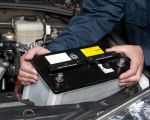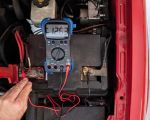Is it Necessary to Replace the Battery if It’s Only a Few Years Old?
When I started noticing that my car wasn't starting as quickly as it used to, I began to wonder: is it necessary to replace the battery even if it's only a few years old? Like most people, I assumed that car batteries only needed replacing when they were completely dead. But after experiencing some early signs of battery trouble, I decided to dive deeper into this issue. What I learned might surprise you. The age of the battery doesn't always determine when it needs to be replaced. There are several factors that can affect your battery's lifespan, even if it’s just a few years old. In this article, I'll share what I discovered about battery replacement, when to consider getting a new one, and why the condition of the battery is sometimes more important than its age.
Car batteries typically last between 3 to 5 years, but their performance can decline much earlier due to various reasons. While some people think that a "few years old" battery should still be fine, the reality is that even relatively young batteries can show signs of wear, depending on external factors. Let's take a look at some reasons why a battery, even if only a few years old, might need to be replaced sooner than expected.
Battery Lifespan and Factors Affecting It
When I first looked at my car's battery, I was surprised to learn that its lifespan depends on more than just the number of years it's been in the car. While the average car battery can last 3 to 5 years, several factors affect how long a battery will actually last in a particular vehicle.
1. Driving Habits
One of the biggest factors that influenced the lifespan of my battery was my driving habits. Short commutes, which are common in urban areas, don’t give the alternator enough time to fully recharge the battery. This was a lesson I learned the hard way. If you mostly drive short distances, your car's battery may not get the full charge it needs to stay healthy. This can lead to premature wear, even on a battery that’s only a few years old. On the other hand, frequent long drives can help keep the battery topped off, potentially extending its lifespan.
2. Extreme Weather Conditions
I had no idea that weather conditions could play such a significant role in battery life until I found myself struggling with a weak battery on a cold winter morning. Cold temperatures can cause a battery to lose its charge much more quickly. In fact, winter is notorious for causing batteries to fail because the cold thickens the fluids inside the battery, making it harder for the battery to produce power. Conversely, extremely hot weather can cause the battery’s fluids to evaporate, leading to the same issue. If you live in an area with extreme temperatures, even a battery that's just a couple of years old could fail much sooner than expected.
3. Battery Maintenance
Maintenance, or the lack thereof, can also impact your battery’s health. Over time, corrosion can build up on the terminals, which can prevent your car from starting properly. It’s something I had to learn the hard way when I noticed the car acting sluggish, even though the battery was still relatively new. Regular checks for corrosion and cleaning the terminals can extend the life of your battery. If neglected, however, this buildup can reduce its performance.
When to Replace Your Battery
Now, the real question: when should I replace my battery if it's only a few years old? There are certain warning signs to look for that indicate it's time to replace the battery, even if it seems like it's still in decent shape.
1. Slow Engine Crank
One of the first signs I noticed when my battery was on its last legs was the slow engine crank. When I turned the ignition key, the engine would hesitate before starting. If you experience this, it could mean your battery is struggling to hold a charge and may need to be replaced, even if it's only a few years old.
2. Dashboard Warning Light
Most modern cars have dashboard warning lights that indicate when the battery isn’t charging properly. If your "Check Battery" or "Charging System" light comes on, it's a sign that your car’s battery or alternator is malfunctioning. Even if the battery is only a couple of years old, this warning shouldn’t be ignored. It’s better to get it checked by a professional than to risk being stranded on the side of the road.
3. Swelling or Leaking Battery
A swollen or leaking battery is another clear sign that it’s time to replace it. I once came across a battery that had visible bulges or leaks, which indicated that the battery had undergone internal pressure. If you notice these signs, it's time to replace the battery, regardless of its age. A damaged battery can be dangerous and could cause further issues with your vehicle.
4. Old Age and Limited Warranty
Sometimes, even if a battery isn’t showing immediate signs of failure, the age of the battery might warrant replacement. If your battery is more than 3 years old, it’s a good idea to have it tested, especially before long trips or extreme weather conditions. Some car manufacturers even recommend replacing the battery before it hits the 4-year mark, as most standard car batteries are built to last between 3 and 5 years.
Steps to Replace a Battery
If you’ve determined that your battery needs replacement, here’s a simple guide to help you understand the process:
- Test the Battery: First, you’ll need to have your battery tested at an auto parts store or by a mechanic. They can perform a battery load test to determine if the battery has enough power to continue functioning. Many shops offer this service for free.
- Choose the Right Replacement: Once it's confirmed that you need a new battery, make sure to choose one that fits your car model. Consult your car manual or ask a professional to ensure you pick the right battery type and size.
- Remove the Old Battery: If you’re replacing the battery yourself, start by turning off the car and disconnecting the negative terminal first, followed by the positive terminal. This minimizes the risk of a short circuit. Then, carefully remove the battery from the engine bay.
- Install the New Battery: Place the new battery in the same orientation as the old one, and reconnect the positive and negative terminals, starting with the positive side. Tighten the connections and ensure the battery is secure.
- Dispose of the Old Battery Properly: Car batteries should never be thrown away in the trash. Most auto parts stores or mechanics will take your old battery for recycling. This helps prevent environmental harm and ensures proper disposal.
Cost of Replacing a Battery
The cost of replacing a battery can vary depending on the type of vehicle and the brand of battery you choose. On average, a new car battery costs between $100 to $200. However, high-performance or specialty batteries can cost more. Labor costs for battery installation can range from $20 to $50 if you're having a professional replace it. While the cost might seem significant, it’s a small price to pay compared to the inconvenience and risk of being stranded with a dead battery.
If you're unsure about whether your car battery needs replacing or want professional assistance, you can always turn to Rescue & Towing for fast, reliable service.


























